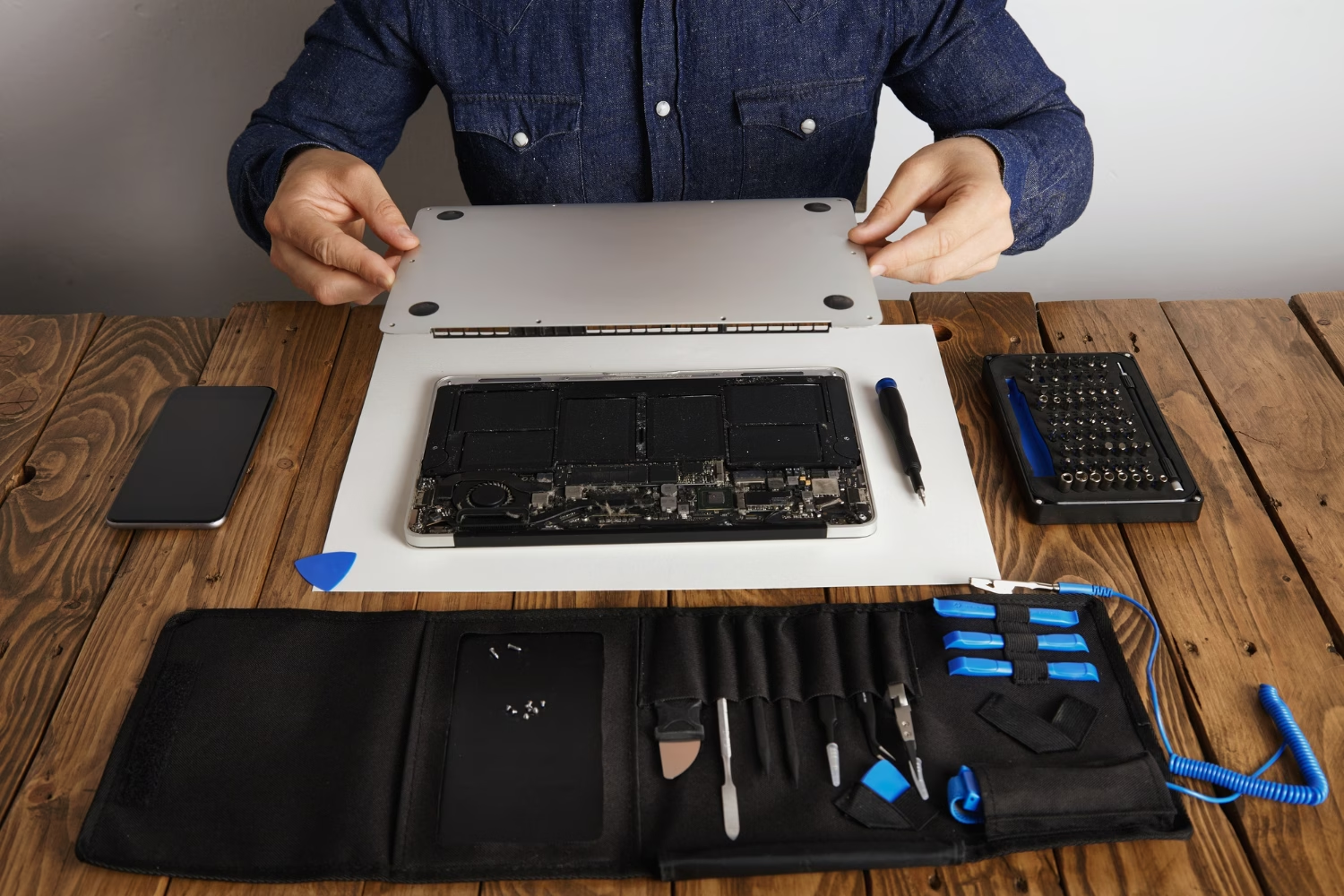Repair or Replace? How to Know When It’s Time to Upgrade Your Laptop

Is your computer acting up and leaving you wondering whether to repair or replace your laptop? From slow performance to unexpected shutdowns, it’s not always easy to know when a quick fix will do, and when it’s time to move on. In this guide, we’ll walk you through the common warning signs, cost considerations, and upgrade options to help you make the smartest decision for your needs and budget.
Before deciding on repairs or a replacement, it’s important to recognize the early warning signs that your laptop might be struggling. Let’s take a closer look at the most common issues users face and what they might mean.
Common Signs Your Laptop Might Need Attention
Not every slowdown or glitch means your laptop is ready for retirement, but recurring issues can signal deeper problems. Here are some of the most common symptoms that suggest your laptop may need repair or replacement:
1. Sluggish Performance
If your laptop takes ages to boot, apps freeze frequently, or basic tasks feel laggy, it may be struggling with aging hardware or bloated software.
2. Battery Doesn’t Last
A healthy laptop battery should last several hours. If yours dies quickly, can’t hold a charge, or only works when plugged in, it may need to be replaced, or it could indicate deeper power management issues.
3. Overheating or Loud Fan Noise
Excess heat, especially when just browsing the web or writing documents, can signal hardware strain or dust buildup. Loud fans often try to compensate, which may lead to premature hardware failure.
4. Physical Damage
Cracked screens, damaged hinges, missing keys, or unresponsive trackpads don’t always mean your device is done for, but they affect usability and may not be worth fixing on older machines.
5. Software Compatibility Issues
If your laptop can’t upgrade to the latest OS, or you find that new apps no longer run well, your hardware may be too outdated to keep up.
When a Repair Might Be the Smart Choice
In many cases, a simple repair can breathe new life into your laptop, especially if the hardware is still relatively modern and the cost is low. Here are situations where choosing to repair makes financial and practical sense:
1. Battery Replacement
Laptop batteries degrade over time, but replacing them is often affordable and can dramatically improve portability and lifespan, especially for laptops less than 4 years old.
2. Upgrading to an SSD or Adding More RAM
If your laptop still uses a traditional hard drive or has limited memory, upgrading to an SSD or adding RAM can offer a huge boost in speed and responsiveness for a relatively small investment.
3. Minor Screen or Keyboard Issues
Broken keys, a dim screen, or a non-functional trackpad might be annoying, but they’re often fixable, especially if you’re comfortable with DIY or have access to affordable repair services.
4. You’re Happy With Its Performance Otherwise
If your laptop still handles your workload but has a small issue (like a loud fan or cracked casing), fixing that one component may be more cost-effective than replacing the whole machine.
5. It’s Out of Warranty, but Parts Are Available
Many mainstream laptops (especially from Dell, HP, and Lenovo) have easily available replacement parts, making self-repair or technician repair a realistic option.
When It’s Better to Replace Your Laptop
Sometimes, repairing a laptop just delays the inevitable, especially when the hardware is outdated, the issues are widespread, or the cost of repair rivals that of a new device. Here are signs that it’s probably time to move on:
1. Major Hardware Failures
A dead motherboard, faulty GPU, or constant blue screens often point to critical hardware issues that are expensive to fix and unlikely to guarantee long-term reliability.
2. It’s More Than 5–6 Years Old
Even if your old laptop still turns on, it might not support the latest operating systems, updates, or applications. Older laptops also tend to have shorter battery life, slower ports, and outdated processors.
3. Repair Costs Exceed 40–50% of a New Laptop
As a general rule, if fixing your laptop costs half or more of what a comparable new one would cost, it’s often wiser to invest in a newer model that comes with a warranty and modern performance.
4. It No Longer Meets Your Needs
Maybe you’ve started using more demanding applications (like video editing, development tools, or virtual machines), or you now work remotely and need better battery life and webcam quality — needs evolve, and your laptop should too.
5. Constant Issues and Downtime
If you’re troubleshooting weekly, reinstalling software, or dealing with random shutdowns, the time and frustration may not be worth it. A new laptop can mean more reliability and peace of mind.
Should You Upgrade Instead?
If you’re unsure whether to repair or replace your laptop, a low-cost upgrade might buy you a few more years of useful life and save you money in the process.
1. Upgrade to an SSD
Swapping a mechanical hard drive (HDD) for a solid-state drive (SSD) is one of the most cost-effective ways to speed up an older laptop. It can reduce boot times, speed up app launches, and improve overall responsiveness.
2. Add More RAM
If your laptop has 4GB or less of memory, upgrading to 8GB or 16GB (if your system supports it) can greatly improve performance, especially for multitasking, light editing, or browser-heavy workflows.
3. Reinstall the Operating System
Sometimes, performance issues are more about software than hardware. Doing a clean install of Windows or macOS can eliminate bugs, clear out unnecessary bloat, and make your system feel like new.
4. Use Accessories to Extend Functionality
External USB-C docks, cooling pads, Bluetooth keyboards, or even a second monitor can make your current setup feel more functional and modern without investing in a whole new machine.
Note: Not all laptops allow internal upgrades. Check your model’s specs or consult a technician before purchasing upgrade parts.
Recommended Replacement Options
If you’ve decided it’s time to replace your laptop, here are three standout choices for different budgets and use cases. Each one balances performance, modern features, and value, making them excellent upgrade paths.
Budget Pick: ASUS VivoBook 15
A great everyday laptop with solid performance for browsing, office work, and light multitasking. Affordable and reliable — perfect for students or home use.
Productivity Pick: MacBook Air M4 (2025)
Apple’s newest fanless laptop offers incredible speed, battery life, and build quality. Ideal for writers, remote workers, and anyone who wants a quiet, powerful machine with macOS.
2-in-1 Pick: Surface Pro 13-inch (11th Edition)
A premium, ultra-portable device that combines the flexibility of a tablet with the power of a laptop. Perfect for users who want touch, pen input, and full Windows compatibility in one sleek package.
Frequently Asked Questions
It depends on the issue. If it only needs a battery or SSD upgrade and still handles your tasks well, repair may be worth it. But if it’s struggling with newer apps or hardware failures, replacement is likely the better move.
A good rule of thumb: If the repair costs more than 40–50% of a comparable new laptop, it’s usually smarter to invest in a replacement.
Yes! Upgrading from an HDD to an SSD, adding more RAM, or reinstalling your operating system can make a big difference in performance, especially for everyday tasks.
If your laptop is out of warranty and the fix is simple (like replacing RAM or a battery), DIY repair can save you money. Just make sure you have the right tools, a repair guide, and replacement parts from a trusted source.
Most laptops last 3–5 years, but high-end models (especially business or MacBook devices) can last longer with proper care and occasional upgrades.
Final Verdict: Repair or Replace?
The decision to repair or replace your laptop depends on a few key factors: age, performance, cost of repairs, and whether it still meets your needs. If your laptop is only a few years old and needs a minor fix, like a new battery or a RAM upgrade, repair can be a smart, budget-friendly option.
But if you’re dealing with major hardware issues, sluggish performance, or a device that’s no longer compatible with current software, replacement is often the better long-term investment. A new laptop can offer faster performance, better battery life, and support for modern tools that improve productivity and reliability.
Bottom line: If you’re stuck deciding whether to repair or replace your laptop, use the signs we’ve outlined to weigh the cost, condition, and your goals.
Still Not Sure Whether to Repair or Replace Your Laptop?
Every laptop and every user is different. If you’re not sure what makes the most sense for your situation, we’re here to help.
Get personalized advice: Contact us for a quick consultation.
Ready to upgrade? Check out our Laptop Buying Guides for expert recommendations.
Whether you’re troubleshooting a slow system or shopping for a powerful new machine, we’ll help you make a smart, confident decision.


